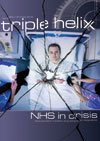Rick Thomas looks at transgenderism and the agenda feeding it.
Government legislation and professional guidelines reflect cultural trends. As culture changes, and with it the notion of what is generally acceptable, the lawmakers follow suit. Thus, what was deemed unthinkable by one generation may be tolerated by the next and commonplace for the next.
Ours is an 'iWorld', (1) in thrall to the cult of individualism. The roots lie in the period of the Enlightenment - the assertion of human reason over divine revelation. Today, autonomy has become 'the moral wallpaper of the modern world'. (2) It is expressed in the appeal for authenticity, the cry for freedom to be 'who we really are', to find personal meaning within ourselves. The one thing we must never do is allow others to impose some external moral code on us.
In this world, traditional binary gender roles are portrayed as constricting social constructs; we must free ourselves to define our own gender identity. Until recently, Facebook offered 71 gender options to enable users to be their true, authentic selves. Now they simply offer three options - male, female and 'custom' - allowing users to insert any label of their choosing, and to change it freely. Gender has been liberated from biology and even those who are uneasy about these changes feel deeply reluctant to challenge any individual's chosen identity, so profound is our culture's commitment to individual liberty and the right to self-define.
The transgender 'movement', like the wider LGBT movement, is not simply about advocacy for acceptance of people who are gender-nonconforming. Its goal is the deconstruction in society of sex and gender, and traditional models of marriage and family, no less:
When we no longer ask 'boy or girl?' in order to start gendering an infant... only then will men and women be socially interchangeable and really equal. And when that happens there will no longer be any need for gender at all. (3)
Such activists would have us believe that Gender Dysphoria - the distress experienced by those whose sense of gender identity is not congruent with their natal sex - is the result of societal pressures to conform to traditional gender roles. Deconstruct those roles, accept the notion of gender as 'fluid', and dysphoria will be no more!
We do well to be aware of this agenda and consider an appropriate response to the activists. The danger is that in seeking to be culturally robust we lose sight of those who are struggling with true gender dysphoria and who desperately need compassionate and sensitive care.
Political trajectory
The cultural trajectory is mirrored in political changes. In 2004, the Gender Recognition Act permitted transgender people to be legally recognised in their 'acquired' gender. Those who are 18+, have been diagnosed with Gender Dysphoria, have lived for a minimum period of two years in their acquired gender and who intend to continue in the same way, may apply for a Gender Recognition Certificate that may be used to obtain a new birth certificate.
The Equality Act 2010 made it unlawful to discriminate against transgender people, and the Marriage (Same Sex Couples) Act 2013 stipulates that a marriage may continue following one partner's gender transition, given the agreement of the other.
In 2016, a House of Commons Women and Equalities Committee report recommended an update to the 2004 Gender Recognition Act that would:
- make 16 and 17-year-olds eligible to apply for gender recognition
- streamline the assessment of child and adolescent service-users to enable earlier use of puberty-blockers and cross-sex hormones
- move Government departments towards 'non-gendering' official records
Medical trajectory
The fourth edition of the Diagnostic and Statistical Manual of Mental Disorders (DSM-4, 2000) listed cross-gender identification as Gender Identity Disorder (Code 302.58). In the fifth edition (DSM-5, 2013), the same phenomenon is renamed Gender Dysphoria (GD), shifting the emphasis from gender incongruence as a disorder to the distress (dysphoria) associated with the experience of that incongruence.
It is important to note that gender nonconformity is not in itself a mental disorder. The critical element of gender dysphoria is the presence of clinically significant distress associated with the condition. (4)
This change appears to have been ideologically driven, the aim being to re-classify gender incongruence, removing it from the list of pathological conditions. As a result, the goal of treatment has moved from the correction of a disorder to the relief of distress. It has become unacceptable to view GD as a form of body dysmorphia, a problem of the mind, with treatment aimed at re-aligning the patient's mind with his/her biological sex. Instead, gender identity is viewed as a matter of individual choice and the goal of treatment to re-align the patient's body with his/her choice. But in a genderfluid world, there can be no assurance that an acquired gender identity will prove as permanent as the results of reassignment surgery.
The Royal College of Psychiatrists published its UK Good Practice Guidelines (5) in 2013, and the General Medical Council (GMC) updated its guidance for doctors treating transgender patients in 2016. (6) GPs are encouraged to refer patients with gender dysphoria to their nearest Gender Identity Clinic (GIC) for consideration of treatment with hormones. Currently there are only a handful of such clinics in the UK and waiting times for appointments can be in excess of twelve months. There is concern that, in the meantime, desperate patients may self-medicate with hormonal products acquired via the internet from non-regulated sources. Patients with co-morbid mental health problems may be referred locally for mental health assessment whilst waiting.
Transgender and children
Cultural change is also reflected in education. In parts of Australia, children as young as three and four years old are being 'helped' by education authorities to undergo gender transition. (7) It appears that 'transgender infants' are being recruited as poster children in support of an ideology lacking a basis in science.
Closer to home, schools and local authorities are encouraging gender-confused children towards trans identities, adopting trans names and pronouns, sometimes against the wishes of their parents. (8) Where parents object, the threat of having their child taken into care may encourage compliance.
The new orthodoxy is turning a blind eye to research. Of those children who present with gender incongruence in their primary school years, a majority will desist naturally during adolescence. (9)80% of children referred to the Gender Identity Development Service in London's Tavistock and Portman NHS Centre subsequently chose as adults to stay with their natal sex. (10)
Attitudes are hardening. A recent scholarly Report (11) by psychiatrist Paul McHugh and biostatistician Lawrence Mayer, of Johns Hopkins Hospital, found no scientific evidence to support the hypothesis that gender identity is independent of biological sex and also concluded that neither genetics nor brain structure plays a significant role in whether people identify as straight, gay or transgender. However, their findings were strongly denounced by students and faculty members at their own hospital as 'a misguided, misinformed attack on LGBT communities'. (12) Science that counters ideology is clearly bad science!
Resisting the tide
In responding to the changes around us, let us affirm:
- facts, not ideology, determine reality
- sex is a fixed biological binary (except in rare intersex conditions)
- when gender identity is divorced from biological sex, chaos ensues and fantasy rules
- when an otherwise healthy boy/man believes he is a girl/woman, the problem lies in his mind, not his body
- social pressure on children/teens to self-define too early must be resisted
- gender incongruence is a disorder, not a reason to celebrate diversity
- the least invasive option of care is the best option, eg changes in name and dress mode rather than hormones and surgery
- there is no horizon to compassion and care, but there are treatment options that are better not endorsed.
Rick Thomas is CMF Public Policy Researcher and co-author of CMF File 59 on Gender Dysphoria.
































